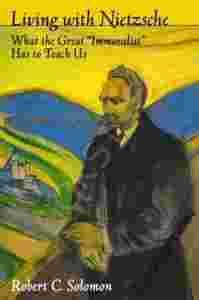|
Friedrich Nietzsche is one of the most popular and
controversial philosophers of the last 150 years.
Narcissistic, idiosyncratic, hyperbolic,
irreverent—never has a philosopher been appropriated,
deconstructed, and scrutinized by such a disparate array
of groups, movements, and schools of thought. Adored by
many for his passionate ideas and iconoclastic style, he
is also vilified for his lack of rigor, apparent
cruelty, and disdain for moral decency.
In
Living with Nietzsche, Solomon suggests that we
read Nietzsche from a very different point of view, as a
provocative writer who means to transform the way we
view our lives. This means taking Nietzsche
personally. Rather than focus on the "true"
Nietzsche or trying to determine "what Nietzsche really
meant" by his seemingly random and often contradictory
pronouncements about "the Big Questions" of philosophy,
Solomon reminds us that Nietzsche is not a philosopher
of abstract ideas but rather of the dazzling personal
insight, the provocative challenge, the incisive
personal probe. He does not try to reveal the eternal
verities but he does powerfully affect his readers,
goading them to see themselves in new and different
ways. It is Nietzsche's compelling invitation to
self-scrutiny that fascinates us, engages us, and guides
us to a "rich inner life." Ultimately, Solomon argues,
Nietzsche is an example as well as a promulgator of
"passionate inwardness," a life distinguished by its
rich passions, exquisite taste, and a sense of personal
elegance and excellence.
|
|

